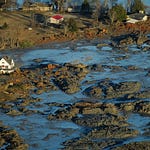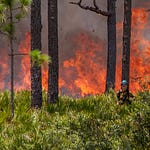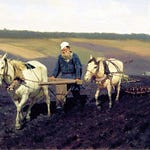In this episode of Discern Earth, I speak with my good friend and materials scientist Caleb Meredith about the concept of energy stewardship. We explore his fascination for the micro-scale properties of materials, how new materials are born, whether there is a distinction between “natural” and “unnatural” materials, and the possibility of a circular material economy. The audio of this episode is choppy unfortunately, but the conversation is high quality so I recommend listening anyways. The below transcript has been lightly edited for readability.
Transcript
David Valerio: Howdy! My name is David Valerio, and this is Discern Earth, a podcast where I ask people who work in nature and climate about why they do what they do. Today I have my good friend Caleb Meredith on the show, and I am not going to introduce him. I'll let Caleb introduce himself briefly, and then we'll just dig into a really great conversation about why he does what he does. So Caleb, why don't you go ahead and give your intro?
Caleb Meredith: I'm a scientist who currently works at an early stage climate startup in the sustainable packaging space. I've spent time at a few tech startups now, as well as in academia. I'm very interested in developing and translating new materials for impact.
David Valerio: My first question is just how did you get interested in science and nature as a child? I want to hear your childhood history and what, if any, particular things stand out to you in terms of making you attracted to the kinds of things that you're attracted to nowadays.
Caleb Meredith: In terms of origin stories, growing up as a kid I spent a lot of time outside in nature. I had a big patch of woods right outside my house where I would play around in the creeks and build tree houses, catch all kinds of critters that I brought home, find arrowheads and stuff. I think that experience of observing and interacting with nature just made me really passionate about being able to explore the natural world as a career. In school, I was good at math and science and that brought me to college where I initially was a chemical engineering major and quickly figured out that that wasn't what I was most interested in. What I realized is that training for the chemical engineering curriculum is a lot more about the process of doing different operations to chemicals and materials—mass balance, heat transfer, thinking about the factory. I was much more interested in sort of the micro-level of the process-structure relationships at the atomic and molecular scale. That luckily is the material science lens I discovered. So I quickly switched into that have been on that road ever since.
David Valerio: It’s so funny how our paths are very similar. I also started as a chemical engineer, if you can believe that, in college and was also thrown off by chemical engineering because there wasn't enough chemistry for me. It's funny that we literally had that same experience. Onto the material science side of things, you mentioned that part of the reason you did not go into chemical engineering was because you weren't interested in sort of that macro-scale understanding of moving chemicals around. How did you get into the micro-scale? Was it like a particular class or a particular person who influenced you in that regard? Or have you always been fascinated by the small?
Caleb Meredith: I think the structure-property-processing relationship, understanding that in different material systems, is the material science lens if I had to describe it like that. So in the courses you learn about metals, ceramics, polymers, semiconductors, other soft matter systems, glass—that's what you're focusing on and you're looking at properties of interest. Whether that be mechanical, optical, electrical, or other functional properties. As you get more applied, you then look at what the manufacturing processes are that you can manipulate to control its structure to achieve those desired properties. That always stays with me when I'm thinking about a new physical system. We're trying to build a material. It's always starting at the bottom.
David Valerio: Right, starting at the bottom and then working your way up. Chemical engineering is not at odds with that, it's just the operating process of bringing a new material in the world and producing it, but the larger scale process of doing that at scale versus the thing that you found yourself attracted to is the lower level, to begin with at least.
Caleb Meredith: They come in a little bit higher in the stack and then above them you have materials designers. People who are trying to match that article with some human need. Keeping all those layers in mind is a important part of any materials application, whether that's in climate or elsewhere.
David Valerio: This is a fascinating point, this holistic perspective you're describing when it comes to preparing a new material and bringing it out into the world. I've never thought of this before. Like the idea of a materials designer, they have certain requirements or desires in terms of the lower level material that's ultimately going to be incorporated into that higher layer. Are there people in this space that are looking at it end to end? Or is everybody in their own little part of that process, but collaboration between people at different stages in the scaling of up of a material is what brings that to fruition. How do you think about that?
Caleb Meredith: I'm sure there are people who share this kind of holistic view, but I don't think it necessarily comes through the academic education process. I think it comes over time, from working on projects, on teams, and in other places, but it's essential. And maybe you call this the product designer. They don't have to come from a scientific background necessarily, but must be someone who's thinking about the context of the human use at the end. That, you know, is really what this lever that we're implementing is all about.
David Valerio: What made you initially interested in material science in particular? I asked you earlier about why the micro versus the macro in terms of chemistry, but micro and macro in chemistry could be applied in many different ways. Like you could think about biology or other topics like this. What made you interested in materials?
Caleb Meredith: I think for physical science versus life sciences, it's less complex for sure. Going into it very young, I had a very Newtonian view of physical systems. You could just understand very mechanistically how everything behaves and that's how things work. Understanding more about entropy and temperature and how non-equilibrium matter systems actually are, that's definitely not the case, but they are still far less complex than living systems. So our ability to understand and engineer them at this point is a lot more developed.
David Valerio: So part of what attracted you to it is that earlier had a more Newtonian, strict materialist deterministic view and thought that the problems of these material sciences are more graspable, something that could be more readily engineered, and that was attractive to you. But now from knowing you, you're more interested in life and the complex. How do you think you got into that place of moving on from the strict determinism?
Caleb Meredith: I'm wanting to like orient myself towards the greater complexity. Both in terms of the things that I work on and starting now in the sustainable packaging space, it's a new area for me. I've joined this company, TerraSafe Materials, towards the beginning of this year. It's a big learning curve and a lot to catch up on. We're using different kinds of biopolymers to create these different things we're working on and the biopolymers are created in some sort of organism. So the feedstock that we're using to create substrates and coatings for packaging, they're starting at a certain level of complexity that's baked into the structure of these materials that's inherent to living systems, to grown things, to ecologies. I think that needs to be embraced, if we're going to come up with some of these more nature-integrated solutions.
David Valerio: Have you found that other colleagues of yours in the space are attracted by this problem? Or is this only a new focus that's just now coming about? Is this a new subfield of material science that is emerging, with a different kind of ethic?
Caleb Meredith: I don't know where it falls categorically. There are people we're working with who, a lot of the papers I read lately come from like forest biomaterials and Earth science departments. It's still physical science. It touches physics, chemistry, and engineering. But I don't know if it has as neat a box when you start looking at the frontier of what's being explored commercially, at least. And that's a good thing.
David Valerio: This gets me to another topic I wanted to explore with you. This distinction or lack of distinction between nature and human, and perhaps how that maps on to how we organize science. Between physical materials that humans have clearly produced and generated in a lab, or are more easily constrained and understood, versus these natural materials where there's sort of a baked in level of complexity and lack of understanding. When you think about your future career and future impact, the questions that you're trying to answer and the problems you're trying to solve, how you see this natural element playing more or less of a role going forward in the kinds of projects that you're working on?
Caleb Meredith: I'm pretty agnostic about whether there's a need to use grown materials, or use organisms and biology to grow the matter that we use in these these different human applications. I think it really depends on what the end use and end of life of the material looks like, if the goal is to create circular sustainable solutions. For example, there's PET which is one of the most produced and consumed synthetic polymers used in textiles and packaging, all kinds of things. There are ways of coming up with that chemical feedstock that can use renewable energy and the carbon can come from bio-feedstocks, where you can just have a closed system for recycling and don't actually need to use something that's cellulosic or another kind of polysaccharide. I don't want to exclude that we need to invent new bio-derived materials for everything that we consume. But we shouldn't rule out these other approaches of integrating sustainable energy into the processes that we use to produce chemicals and turn them into materials. Does that make sense?
David Valerio: Yeah, that was what my question was getting at, because like you said, when you think about the circular economy—one version of it is to go completely to nature, right? Only use natural materials, use things only produced by the energy of the sun and figure out how to readjust our civilization to run on those kinds of materials. Versus another one, the vision that you're laying out, is agnostic on where the source of these materials are. The constraint being that we're not unsustainably sourcing them.
Caleb Meredith: Yeah we still need to harness the energy, from the sun or these other sustainable sources, but then channel it into other ways of converting matter.
David Valerio: So it's essentially like, not just photosynthesis, although photosynthesis is great. Whether the energy comes through renewables through wind or other energy sources, that would be a good move.
Caleb Meredith: There's also these maybe more in between or less distinct processes where maybe we're using enzymes or we're using bacteria to create one feedstock, but then we're separating that and using more like conventional polymer synthesis manufacturing processes with that feedstock that came from biomolecules or biochemistry.
David Valerio: On this topic of future scenarios and sort of broader transitions—energetically and materially. I'm going to ask you a high level question about your own particular impact. What are you striving for Caleb? What are you seeking to do through your work? What is the main point of impact that you're looking to accomplish through your scientific and commercial ventures?
Caleb Meredith: I wish I had a clearer answer there. I definitely want to have an impact, but so far it feels like a lot of the things that I have put my time into have been opportune ways to just explore interesting things. I guess if I were to boil it down, I'd say I want to use my science and engineering background to develop technologies that that allow us to be better stewards of energy.
David Valerio: That's a great description. I think we had talked about this earlier, as an individual with this high level goal to develop better materials, or materials that help us more sustainably steward our energies, that could take any number of different forms. So I think that's a great goal to have. It's a matter of now you're in explore mode, identifying what are the particular verticals where your skills can be best applied. Then, perhaps once you identify the particular area of the world where it's like, oh, your skillset is absolutely perfect for this thing you go all in on it.
Caleb Meredith: I don't want to make it sound like it's been totally random. I do have a breadth of experience, but most of it falls into working with soft matter, polymers, liquids, complex liquids, and colloids. There is some compounding going on where the experiences I have working with different natural and synthetic systems as well as these manufacturing processes. There are only so many industrially scalable ways to to form polymers. Casting, extrusion, injection molding, I think you can probably come up with a couple more, but forming operations for controlling how polymers process. In a lot of the systems I've worked on, I'm getting a lot of depth in those areas. Whether those end up leading me towards applications in these packaging materials or not, it could also be applicable to building materials, transportation, energy.
David Valerio: Like you said, you have a particular area of material science, soft materials, and there's constraints around the kinds of materials that are generated at scale there. Identifying, which of those materials are potentially most impactful and most personally attractive to you and going and using your skills in that set is something to explore. I'm curious, with your current work with TerraSafe doing sustainable packaging materials, you know, how you found moving into this new field of application. What are the things you're learning right now that have got you most excited about it?
Caleb Meredith: I love my job here at TerraSafe. I'm very excited about what we're doing and what many other folks are doing who are trying to tackle this ginormous problem of packaging and all the things that it touches. We're primarily focused on food packaging applications. A bit about the company, we recently started out a venture studio backed by Big Idea Ventures and their Generation Food Rural Partners Fund. We've identified a number of unlicensed technologies in this space of sustainable packaging materials and we're using these different families of technologies, that all involve biopolymers for coatings and substrates, with the goal of replacing single-use plastics and styrofoam in the food application space. Using those as starting points to evaluate and invent on top of and try and commercialize.
David Valerio: Single-use plastic seems like a huge deal to address. I’m not sure exactly what the climate impact of it is, but for me, aesthetically it's terrible. Obviously a lot of ocean plastic degradation results from its use. You look around various forests and see it everywhere. How do you see this particular set of technologies and scientific advances that you're currently working with approaching the problem of replacing these materials in a different way from others? What is the scope of other materials that could potentially be doing these things? And how does yours fit in?
Caleb Meredith: There are so many possibilities that I hesitate to even list all the ways that we're going about it and other people are going about it. As I mentioned before, with the PET example, there are a lot of ways to go about it. My view is let a thousand flowers bloom. We should have as many parallel efforts that are well-resourced and have the right team and resources behind them to investigate whether different feedstocks and different compositions of different biopolymers and other materials can create a product. Because at the end of the day, it's a product that needs to meet these real world requirements. It's really hard because not all of it is on the technology side. There's that design component. There are societal behaviors. There are these infrastructure systems for recycling and and creating the original feedstocks. So it's just very, very complex.
David Valerio: How would you define a circular economy? And do you think it's possible to achieve?
Caleb Meredith: I'll go back to the level of energy and start there. A circular economy, or a circular materials economy, depends on the matter and energy that are going through the system. The inputs are renewables and the matter is more or less closed loop. It's external ecological impacts are being managed.
David Valerio: I think that’s a great definition. Onto the implementation side of things, I suppose I see more potential for the energy side of that equation being solved. In terms of like renewables and solar, maybe the world maxes out on nuclear energy for base load power. From the materials side, I just frankly don't know enough about it to really have an opinion. Given that it touches literally everything that we touch, I feel like it's hard for anybody, any single person to have an opinion. But I'm going to ask you anyways. How could material circularity be achieved? Does this scenario involve continued economic growth? How do you think that's feasible, potentially?
Caleb Meredith: I would say in so far as economic growth is required to keep up the deployment of all this renewable energy that we're going to need to solve this problem, yes that growth will be necessary and there will be externalities with all the extraction and conversion that are implicit within that. Once we have all this renewable energy that we're harnessing, there are lots and lots of ways that it can be plugged into transforming matter, up and down the stack.
David Valerio: It sounds like from your perspective, should we solve the energy problem the that would enable us to transform any set of material substrates into things that we need and continuously do that circularly. Is that right?
Caleb Meredith: Yeah, I would say the more sustainable energy we can harness, the more we can come up with impactful ways to put it to work. The good news is that from what I can tell, looking at the statistics about solar, wind and other renewables deployment, that transition seems to be happening. The tech stack is pretty mature for some of them. The rollout on these things and the scale that they're being deployed at makes me very optimistic in the longterm.
David Valerio: I was curious how, and if at all, spirituality, philosophy, and/or religion plays a role in the work that you do now. How do you see that motivating you, if you do?
Caleb Meredith: I definitely have a desire to create impact through the work that I do. I want to leave the Earth a better place than I found it. That's something that drives me. I think being a good steward of energy is something that's maybe universal there. Because really, you don't have to be a material scientist working on developing new materials to care about it. The idea of energy applies to all of us in the things that we work on, the decisions we make, and how it affects the behavior of humans and the machines that are carrying out our desires and decisions. I want to see humanity further in its existence so that we can continue to understand and explore, not just the forests outside our houses, but the cosmos. I also want this to happen because I think it has the ability to relieve a lot of unnecessary suffering in the world.
David Valerio: That makes a lot of sense in terms of practicing good stewardship seems to be to some degree a human universal, even if we don't practice it well. It depends on what we want to steward. The energy lens is the most interesting thing in particular about your story. Given your science background and how you think about the world, you see your calling as being to help humanity manage energy in a sustainable manner so that we are not continuing to degrade the environment that's around us. How has this vision for why you do what you do evolved over time?
Caleb Meredith: That articulation is more of a recent thing that has come with a little more time to learn and reflect. But I think the drive to leave the world a better place, to relieve suffering and all that, I think that was passed down to me in my upbringing.
David Valerio: And then stewardship of energy is the way to do that. Progress, economic growth, expansion. I'm curious, was your family religious?
Caleb Meredith: I was raised in a Jewish household. My Mom is Jewish. My Dad came from a more secular Christian background. I went to Hebrew school and to synagogue growing up. I actually didn't end up getting bar mitzvahed. By the time I was like 11 or so and I didn't want to be involved with organized religion. I had a lot of negative associations that I wanted to push back against. Over time, I've come back around and view myself as a spiritual person. I have also come to see the value in the cultural and religious traditions that I was exposed to. I think they bring a lot of good through the ethics and the morals that they can instill generation to generation.
David Valerio: So you were raised Jewish, had your rebellious phase, when did you say, at 11? That's pretty early. But as you've grown you now see the value of the religious inclination. How do you think you changed your mind on that?
Caleb Meredith: I think just life experience for one, but also the complexity of things and finding out that when I wanted to look into what I thought was the bottom of this microscopic world, there’s actually a lot below the micro-scale that we still don't understand and we'll be reckoning with for some time, maybe forever.
David Valerio: I had sort of had a similar experience. I was raised Christian, but my family stopped going to church around middle school. I was never an atheist, but I was more or less agnostic until college. I was always pro-religion in that I saw the instrumental value of it to my family. I just didn't have an opinion. Part of the reason at first that I was very against religion was like, oh, supposedly science is opposed to religion. The findings of science make it an impossibility for somebody who wants to be reasonable to believe. But when I dug into Earth science and was learning more about the natural world, about various biogeochemical cycles and natural complexity, I was like, wow, there's so much we do not know. There's something mystical here. We know so little, such that at least the possibility of God existing became larger by virtue of me digging into science and seeing and realizing that, wow, there's so much uncertainty. In a sense, becoming more skeptical made me more open to the idea of God.
Caleb Meredith: I think recognizing that the complexity is so great at all these different scales of the natural world, and that it's baked into our ability to observe physical systems and experience the world, in a way that we can't interact with. We are embedded within this larger thing. The epistemic humility that came with that realization remains with me.















Share this post